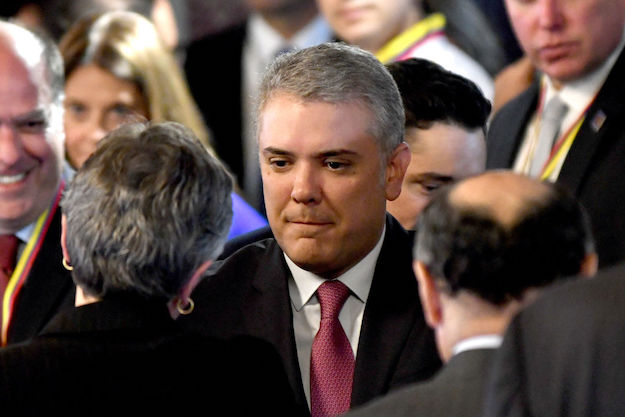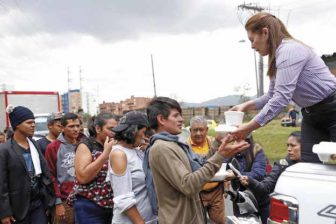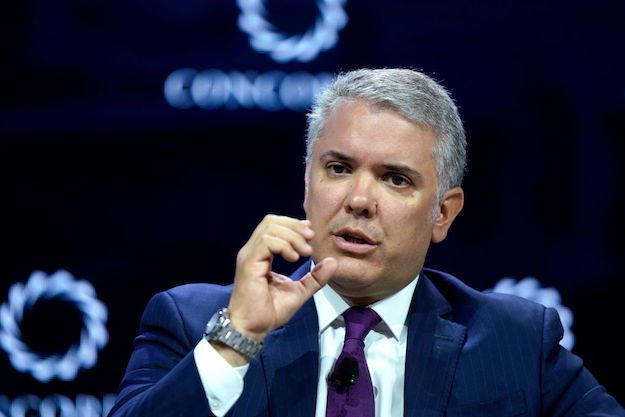Colombia’s President Iván Duque has struggled to find a rhythm in his first eight months in office. But his decision to go all-in against his predecessor’s peace deal with the Revolutionary Armed Forces of Colombia (FARC) could spark a change in his political fortunes.
Earlier this month, Duque launched a formal challenge to key aspects of the agreement signed by former President Juan Manuel Santos that in 2016 put an end to five decades of conflict with the FARC. Duque’s objections targeted the Special Jurisdiction for Peace (JEP), a parallel court system designed to try war crimes committed during the conflict. The JEP helps provide legal guarantees to former combatants who traded public testimony for lighter sentences – a concession that was fundamental in bringing the FARC to the table.
Duque’s recent push against the agreement could help him rebuild political capital after a lackluster start to his presidency. He won the 2018 election in part on a promise to revise the deal, capitalizing on his Democratic Center party’s opposition to the agreement. But Duque’s decision not to focus on the peace process has weakened the party’s support for his reform agenda in Congress. Bringing the JEP back to the frontlines of political debate may help Duque reignite his base.
“Ambivalence is over, that is a win,” Sergio Guzmán, director of Colombia Risk Analysis, a Bogotá-based political risk consultancy, told AQ.
This could prove particularly important ahead of regional elections in October – a crucial test for Democratic Center, which currently holds only one governorship out of 32 states.
“They are mobilizing public opinion around a very divisive issue, the idea of full impunity for FARC members, and repeating the tactics they used … during the presidential campaign,” Diego García-Devis, Senior Program Officer of Drug Policy at Open Society Foundations, told AQ.
Duque’s appeal to his base may help him stabilize rocky approval numbers, which hit a low of 27 percent in December before recovering to 42 percent in February – after he took a strong stance against Nicolás Maduro and condemned an ELN terrorist attack earlier in the year. The polls seem to have rewarded Duque’s decisiveness, and the bold announcement against the peace deal could have a similar effect.
Time is also on Duque’s side. His objections will delay full implementation of the JEP, as legislative debate could last until the end of the year. Democratic Center politicians have also been quick to capitalize on recent corruption allegations tied to JEP officials, a boon for a party that underpins much of its political capital on polarization surrounding the peace deal.
But the proposed changes to the JEP carry risks.
Uncertainty around the future of the deal weakens an already fragile post-conflict political environment. The JEP will continue to function despite Duque’s objections, but its credibility could be undermined. The opposition Green Party’s Juanita Goebertus went so far as to say that the government was creating a “crisis of confidence” that put the entire peace process at risk.
“Combatants will start losing trust in concentration zones (where they’ve been promised safe haven). It creates a legal limbo,” said García-Devis.
In the near term, Duque might not have the votes he needs in both houses of Congress to approve any revisions made to the Constitution.
“The government faces an uphill battle,” said Guzmán. “It is making a very big gamble that can backfire if it doesn’t win the support of independent parties, which would effectively leave it as a minority government.”
The Green Party and the independent Liberal Party have already stated they will vote against Duque’s objections regarding the JEP. The president will need support from the National Unity Party and Radical Change, both of which are divided on the issue, if he hopes to prevail.
Duque has three years left in his term, and in that time hopes to pass several substantial reforms that will require support from independent parties. A loss on the peace accord could deepen the governability challenges his administration already faces.
Duque is also risking his reputation with the international community, which has been a staunch supporter of the peace deal and provides significant financing for post-conflict development programs. The United Nations quickly ratified its support for the JEP after Duque’s announcement.
“It creates a moral hazard, it undermines the government’s ability to live up to its international commitments,” said Guzmán.
The Constitutional Court has a final say on any changes made to the JEP and could shut down Duque’s revisions. It ratified the original law approved during the previous legislative term, and has announced that it will not make a ruling until Congress revises the objections.
Duque’s push against the JEP places him firmly alongside his political mentor and the Democratic Center’s leader in the Senate, former President Álvaro Uribe. That could bring political gain. But Duque also runs the risk of his presidency being defined by opposition to the peace deal – rather than the reform agenda he so hopes to pursue.
—
Riaza is public policy associate at AS/COA







